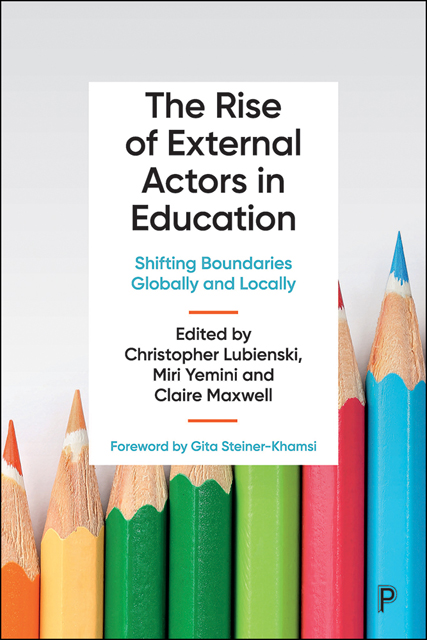Book contents
- Frontmatter
- Contents
- List of figures and tables
- Notes on contributors
- Foreword
- Introduction
- 1 Collective parental involvement: an in-between actor
- 2 When teachers become the external actor: private tutoring and endogenous privatisation in Cambodia
- 3 Cross-sectoral alliances in charter schools: the role of boards of directors from for-profit and non-profit sectors
- 4 A communitarian framework for understanding the relations between schools and NGOs
- 5 PISA for sale? Creating profitable policy spaces through the OECD’s PISA for Schools
- 6 Historical reconfigurations of internal/external actors in Danish educational testing practices
- 7 A short history of external agency involvement within education in contemporary Poland
- 8 New philanthropy in the heterarchical governance of education in Brazil
- 9 Venture philanthropy and the rise of external actors in Australian education
- 10 Power struggle in education policy change: the role of knowledge actors in structural reforms in Chile
- Conclusion: Complexity and intentionality of external actors in education
- Index
1 - Collective parental involvement: an in-between actor
Published online by Cambridge University Press: 13 October 2022
- Frontmatter
- Contents
- List of figures and tables
- Notes on contributors
- Foreword
- Introduction
- 1 Collective parental involvement: an in-between actor
- 2 When teachers become the external actor: private tutoring and endogenous privatisation in Cambodia
- 3 Cross-sectoral alliances in charter schools: the role of boards of directors from for-profit and non-profit sectors
- 4 A communitarian framework for understanding the relations between schools and NGOs
- 5 PISA for sale? Creating profitable policy spaces through the OECD’s PISA for Schools
- 6 Historical reconfigurations of internal/external actors in Danish educational testing practices
- 7 A short history of external agency involvement within education in contemporary Poland
- 8 New philanthropy in the heterarchical governance of education in Brazil
- 9 Venture philanthropy and the rise of external actors in Australian education
- 10 Power struggle in education policy change: the role of knowledge actors in structural reforms in Chile
- Conclusion: Complexity and intentionality of external actors in education
- Index
Summary
Introduction
The dominance of neoliberal policies across education systems means that states do not necessarily see themselves as being the exclusive authority responsible for financing and providing all necessary educational services (Harvey, 2005; Ball & Youdell, 2008). This change is sometimes referred to as a ‘meta social change’ that redraws the traditional boundaries of social categories (Beck, 2000) and, along with decentralisation, requires schools to adapt to multi-contextual environments (for example, cultural, political, social) that shape their provision and status (Hallinger, 2018). Being integral to their communities, schools, in these neoliberal times, need to develop and sustain relationships within a web of diverse external stakeholders (for example, non-governmental organisations (NGOs), the business sector, political bodies; see Addi-Raccah, 2006; Hoy & Miskel, 2008), many of which are not formally affiliated with schools but influence the environment in which they operate (Hoy & Miskel, 2008).
Following Honig (2009), I refer to external actors/ stakeholders as nonsystem actors who ‘work with, but [are] distinctly outside public educational systems’ (p 394). This stands in contrast to system actors, who, according to Coburn (2005), ‘constitute state and local governance of schooling, including state departments, county offices, school districts, and schools’. Collaboration with external stakeholders is perceived by researchers and practitioners, such as school principals, as influencing school provision and culture and contributing to school improvement (Keddie, 2015; Keddie et al, 2018; Ni et al, 2018). Building a partnership with diverse external stakeholders is therefore acknowledged as a significant component of successful school leadership today and a key priority emphasised across education policy worldwide (for example, Hargreaves & Harris, 2015; Scott & Halkias, 2016; Simkins et al, 2019). As school collaboration with external stakeholders emerges as a norm for school success and improvement, school principals adopt such practice with the aim of securing their legitimacy (Desai, 2018; Shuffelton, 2020).
One pivotal group of stakeholders within education is parents, as they have an obvious interest in being involved in their children's education. Parents’ investment in their children's education is promoted by policies designed to facilitate partnerships between schools and parents, which has the effect of intensifying parents’ responsibilities towards their children's education (Ball, 2012).
- Type
- Chapter
- Information
- The Rise of External Actors in EducationShifting Boundaries Globally and Locally, pp. 10 - 30Publisher: Bristol University PressPrint publication year: 2022



